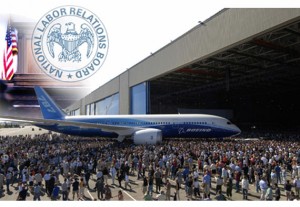LOCAL
Boeing sought delays, refused talks in NLRB case
As expected, the local newspapers (Everett Herald and Seattle Times) and the corporate lobbyists to whom they grant a regular platform have roundly criticized the International Association of Machinists District 751 for having the temerity to file a complaint when they believed Boeing broke the law by retaliating against the union’s members for going on strike. And of course, they also lambaste the National Labor Relations Board for daring agree with the union based on the company’s repeated public comments that it had, in fact, chosen to assemble 787s in South Carolina specifically because the Machinists have gone on strike.
 In the process, the local corporate media machine has ignored the facts of the case — Did Boeing break the law? What is the law? Are there any consequences for breaking this law? — and instead focused on the NLRB’s proposed remedy: that Boeing move all 787 assembly back to Washington state. Their how-DARE-the-government-tell-a-corporation-what-to-do perspective smacks of the U.S. Chamber of Commerce’s recent hubris-dripping proclamation that “it will not tolerate” the Obama administration requiring government contractors to disclose their political contributions.
In the process, the local corporate media machine has ignored the facts of the case — Did Boeing break the law? What is the law? Are there any consequences for breaking this law? — and instead focused on the NLRB’s proposed remedy: that Boeing move all 787 assembly back to Washington state. Their how-DARE-the-government-tell-a-corporation-what-to-do perspective smacks of the U.S. Chamber of Commerce’s recent hubris-dripping proclamation that “it will not tolerate” the Obama administration requiring government contractors to disclose their political contributions.
So what of the NLRB complaint against Boeing? May Boeing have had a role in it?
IAM District 751 lays out the facts today at its blog, explaining the simple reason it filed the complain (to stop Boeing’s illegal threats against its members) and reporting that “Boeing management has not been interested in talks to settle the issue, even though the NLRB says that’s typical in these kinds of cases.”
As for the corporate pundits who criticize the NLRB’s timing of ordering production to be moved here long after Boeing had begun constructing its South Carolina facility, the IAM points out that Boeing management has itself to blame.
“I lost track of how many times Boeing asked for – and received – more time during the investigation,” (IAM 751 President Tom) Wroblewski wrote. “For them to complain now that the process took too long is much like a teenager whining about having run out of gas after deliberately driving past a half-dozen gas stations.”
Check out the IAM’s side of the story, and then ask yourself, why are local commercial newspapers so hostile to the interests of working people, while national media (New York Times and Washington Post) can see the merits of the NLRB’s case and discuss the important legal questions it raises. Discuss.





